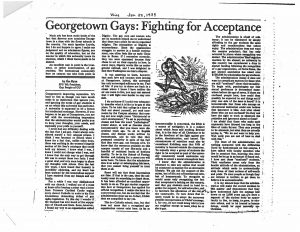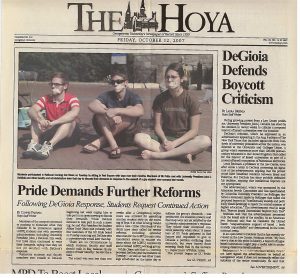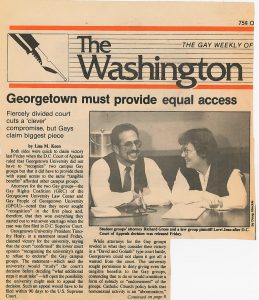Gay Rights Coalition v. Georgetown Univ. – The Origins
LGBTQ students at both the main campus and the law center  began to organize in the late 1970s for access to benefits and recognition for a gay group on each campus. In a time before Google Drive and cell phones, access to a mailbox and a phone on campus was key for student groups to function. After initial approval was abruptly rescinded, and with the attempts at accessing benefits rebuffed, the coalition of LGBTQ students took their University to court.
began to organize in the late 1970s for access to benefits and recognition for a gay group on each campus. In a time before Google Drive and cell phones, access to a mailbox and a phone on campus was key for student groups to function. After initial approval was abruptly rescinded, and with the attempts at accessing benefits rebuffed, the coalition of LGBTQ students took their University to court.
A Roller Coaster Ride Through the Courts
The lawsuit between the two gay student groups, Gay People of Georgetown (GPGU- Main Campus) and Gay Rights Coaltion (GRC – Law) bounced up the court system over an eight-year period beginning in 1980.
Right off the bat, the D.C. Superior Court announced a preliminary ruling in early 1981 that Georgetown University (GU) had violated the D.C. Human Rights Act. GU insisted that a trial take place, of course, to fully review the legality of their withholding access to benefits from the gay student groups. The trial took two years to conclude, having been prolonged by the ill-timed retirement of the presiding Justice in the Superior court.
In 1983, the D.C. Superior Court ultimately ruled that Georgetown could deny the student groups access to benefits on the grounds of preserving the First Amendment’s protection of religious freedom. The student plaintiffs quickly appealed.
In 1985, a 3-judge panel subset of the D.C. Appeals Court reversed the Superior Court’s ruling. By stating that access to benefits does not necessarily confer official recognition, the panel argued that Georgetown must provide benefits to the gay groups. However, the ruling meant nothing without an immediate rehearing by the full bench of the Appeals Court. This rehearing took two more years.
Finally in late 1987, the full D.C. Appeals Court confirmed the opinion of the 3-judge panel and officially demanded that GU comply with the D.C. Human Rights Act. The student plaintiffs preemptively celebrated as they waited another year for GU to consider appealing to the U.S. Supreme Court or not.
Ultimately, in 1988, Father Healy sent out a concession letter of sorts, declaring that the lawsuit was over. He insisted that GU had maintained the integrity of its Catholic identity by accepting the Appeals Court ruling and separating language of official recognition from the provision of benefits to any student group on campus.
The Out for Change Campaign
On September 9, 2007, a gay Georgetown student was attacked because of their perceived sexual orientation. This incident, along with the University’s delayed response, was the last in a string of hate crimes that sparked the creation of the OUT for Change campaign. Student leaders involved in GU Pride and the Georgetown Solidarity Committee (GSC) created and led the campaign. Using tactics GSC had utilized for their Living Wage campaign, members of the OUT for Change campaign held rallies and used petitions to apply pressure to the University to address their four demands: better resources for LGBTQ students, more education around LGBTQ issues to the entire campus community, improved systems for reporting hate crimes more quickly, and a revised LGBTQ Working Group. Their petition received approximately 1,600 signatures and overwhelming support from faculty members and academic departments. After members of the campaign were barred from entering Healy to present President DeGioia with their petition, President DeGioia announced that he would hold an open forum on October 24, 2007 to address recent incidents on campus.
Student leaders involved in GU Pride and the Georgetown Solidarity Committee (GSC) created and led the campaign. Using tactics GSC had utilized for their Living Wage campaign, members of the OUT for Change campaign held rallies and used petitions to apply pressure to the University to address their four demands: better resources for LGBTQ students, more education around LGBTQ issues to the entire campus community, improved systems for reporting hate crimes more quickly, and a revised LGBTQ Working Group. Their petition received approximately 1,600 signatures and overwhelming support from faculty members and academic departments. After members of the campaign were barred from entering Healy to present President DeGioia with their petition, President DeGioia announced that he would hold an open forum on October 24, 2007 to address recent incidents on campus.
The Townhall
At the 2007 Townhall, President DeGioia committed to the creation of a fully staffed and full funded LGBTQ Resource Center by the fall of 2008 and asserted that supporting LGBTQ members of the campus community was inextricably tied to Georgetown’s commitment to Jesuit values. This win was a direct result of the successful student organizing during a unique moment of a shifting national climate around LGBTQ issues, in many ways building off of the decades-long legacy of LGBTQ activism established both at Georgetown and across the country.
You can read President DeGioia’s remarks at the Townhall here.
The LGBTQ Resource Center Today
Now, 10 years after the start of the OUT for Change campaign, the LGBTQ Resource Center seeks to highlight the efforts of those student leaders. Their unwavering commitment to justice created a space for future LGBTQ students to seek support and thrive. Although some of them knew they would never personally benefit from the creation of the Center, they were committed to making Georgetown a better place for generations to come. The OUT for Change campaign was a beautiful example of coalition work, student organizing, and the power of student activism. As we celebrate the success of the campaign, we ultimately hope this digital history archive will inspire current and future students to recommit themselves to pushing Georgetown to be a better and more inclusive place. Let their student activism truly become expressions of a better Georgetown.
